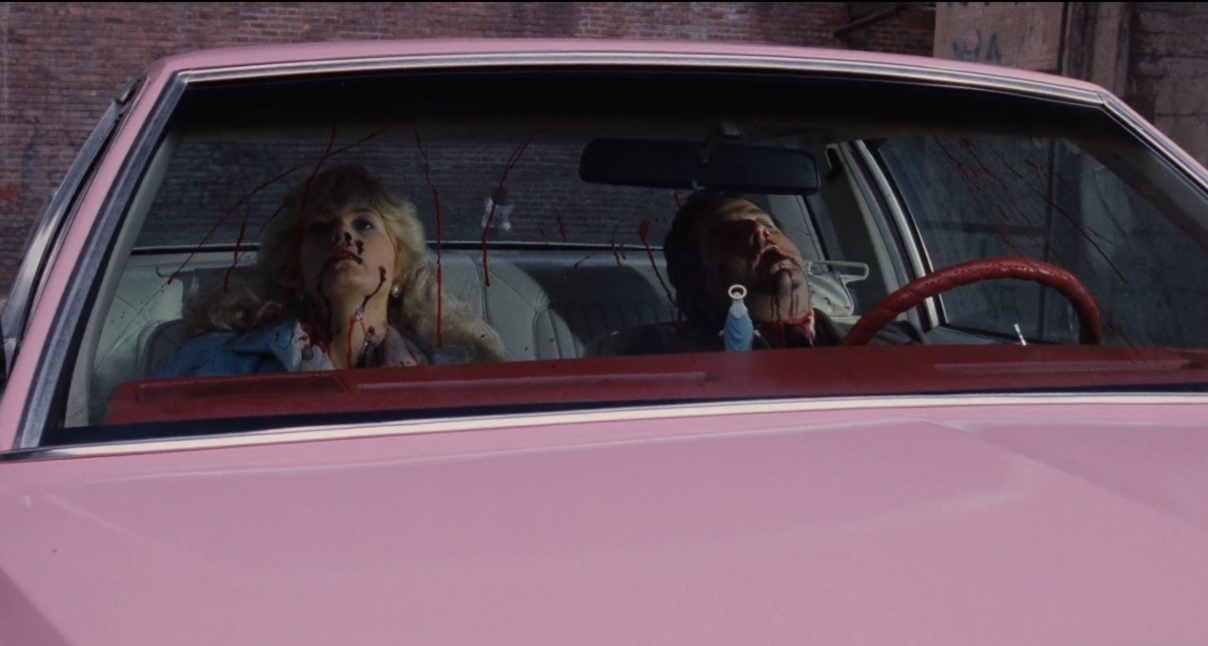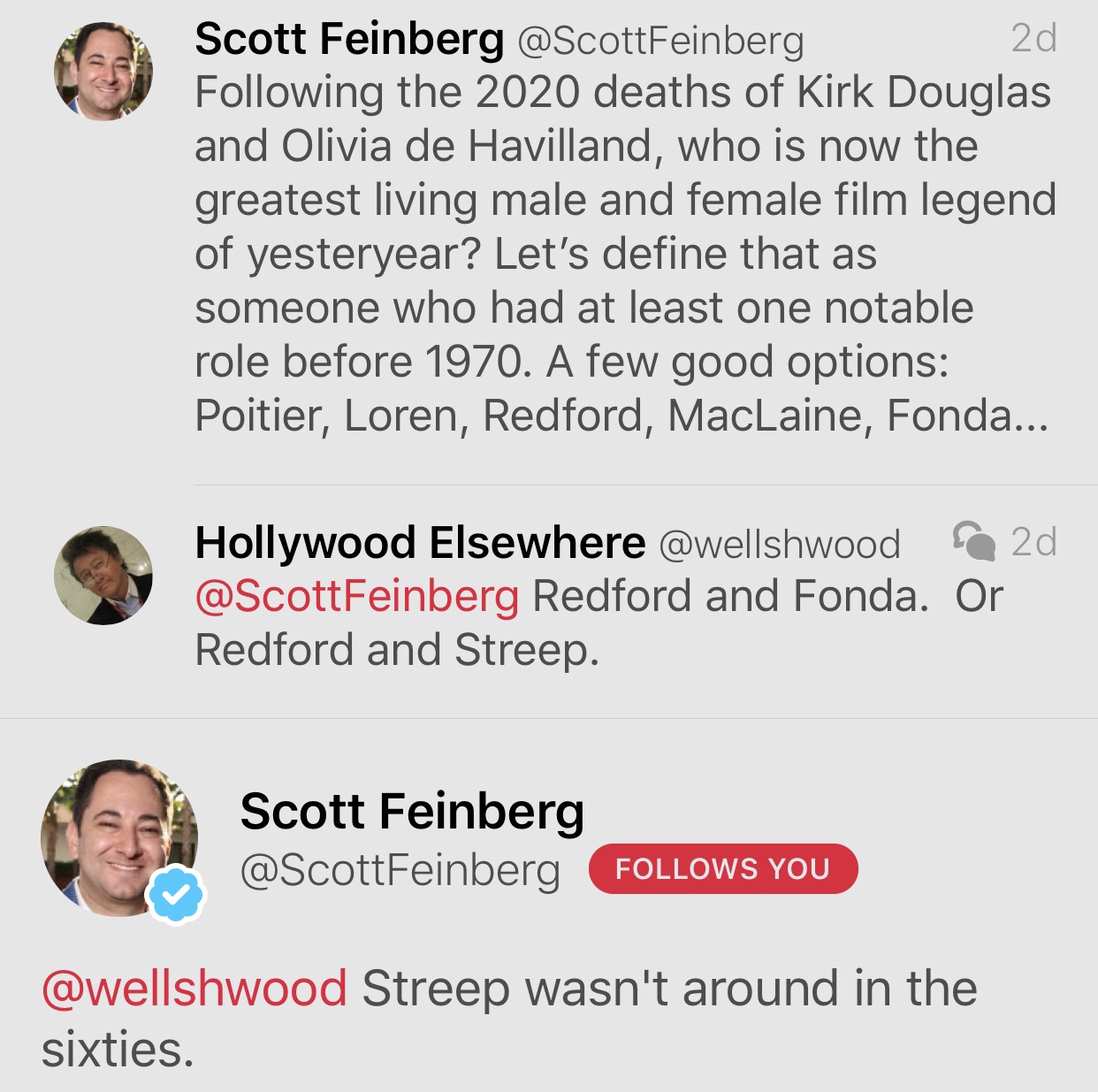
Aronofsky’s Druggie Classic
A remastered 20th anniversary 4K version of Darren Aronofsky‘s Requiem for a Dream will pop on 10.13.20. The critically admired film, based on Hubert Selby Jr.‘s 1978 novel and worshipped by Midwestern Evangelical audiences, opened on 10.6.00. (I’m kidding about the Evangelicals.) Presented in Dolby Vision with a new Dolby Atmos audio track + a pair of new behind-the-scenes featurettes.
Skin Game
Danny Wolf and Paul Fishbein‘s Skin: A History of Nudity in Movies (on demand, 8.18) is a sharp, highly intelligent doc that covers its own waterfront in a diverting, dryly amusing fashion. It’s not so much the nudie clips (here’s a three-hour, 45-minute reel that offers a lot of the same stuff) but the commentary that seals the deal.
I wasn’t expecting that much at first, but I sat up as I began to realize that the talking heads were elevating and deepening the focus with sage observations and occasional razor-sharp quips.
I’m talking about Sean Young, Peter Bogdanovich, Eric Roberts, Traci Lords, Pam Grier (who’s put on a few pounds since Jackie Brown), Malcolm McDowell, Sybil Danning, Bruce Davison (who delivers a funny line about Ben), Mr. Skin‘s Jim McBride, HE’s own Joe Dante, former employer Kevin Smith, the great Amy Heckerling (Fast Times at Ridgemont High), the late Sylvia Miles, the very much alive Erica Gavin, Liz Goldwyn, critics Amy Nicholson, Richard Roeper and Mick LaSalle, CARA ratings board member Joan Graves, film maven Irv Slifkin, The Hollywood Reporter‘s Tatiana Siegel and several others.
I was a tiny bit scared about reviewing this doc with any enthusiasm for fear of getting the side-eye from #MeToo types. Right now we’re living through the blandest, most buttoned-up, erotically stifled and almost Victorian eras in U.S. (or even human) history, more so than even the Eisenhower 1950s
Time and again actors (mostly actresses) who were in their prime back in the ’70s, ’80s, ’90s and early aughts remind us that time and biology are assassins — they spare no one. You can’t watch this film and not think “wow, aging is a mother.”
As we watched Tatiana asked what my all-time favorite nude scene is, and I honestly couldn’t think of one off the top of my head. Now I’m thinking it might be Kim Novak‘s bedroom scene in Of Human Bondage (’64). In and of itself nudity has always gotten my attention, but it’s never been that transporting. The tingle quickly fades.
Boilerplate: “The definitive documentary on the history of nudity in feature films from the early silent days to the present, studying the changes in morality that led to the use of nudity in films while emphasizing the political, sociological and artistic changes that shaped that history. [Also] a study of the gender inequality in presenting nude images in motion pictures and will follow the revolution that has created nude gender equality in feature films today. It culminates in a discussion of ‘what are nude scenes like in the age of the #METOO movement’ as well as a look at CGI nudity that seems a large part of motion pictures’ future.”
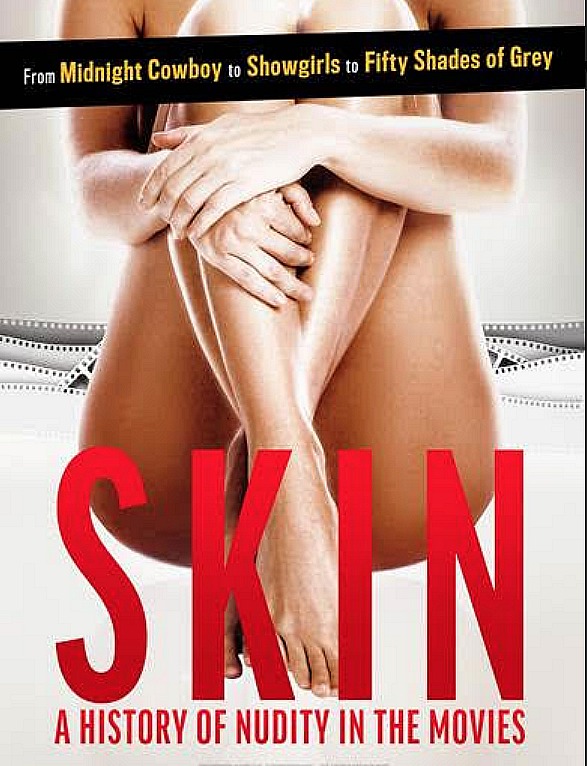
Who Smokes In Their Late 40s?
Does anyone know any reasonably healthy, non-neurotic fellows in their late 40s who smoke? A significant percentage of party people (i.e., druggies and boozers) tend to smoke in their teens, 20s and 30s, but most of them realize they have to step off that train by age 40 if not sooner. Ben Affleck is 47, and days away from his 48th. I don’t know if he’s a regular smoker or if he’s just chipping, but giving in to a nicotine urge is just a step or two removed from drinking again. For years I was a Cannes Film Festival smoker, but that doesn’t count. U.S. residents can steal guilty cigs in Europe or Asia but no smoking on home ground — that’s the rule.
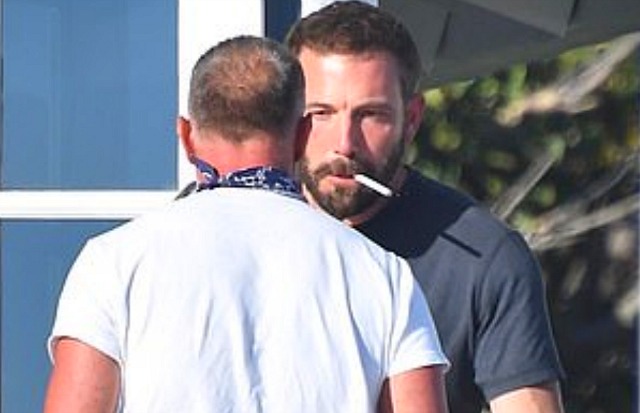
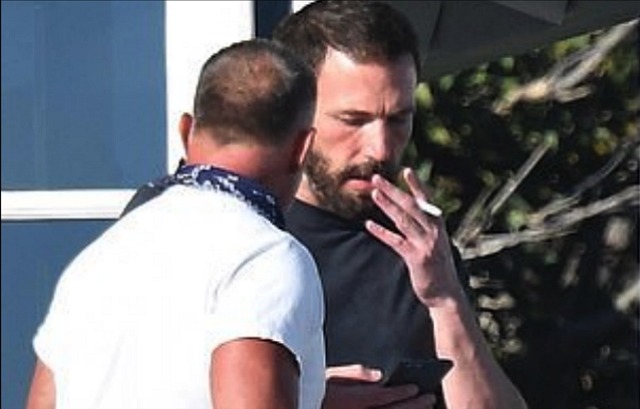
Sumner Redstone Built, Fought, Endured
As it must to all men, death came yesterday to Sumner Redstone, the scrappy, swaggering, carrot-haired media magnate and “daring dealmaker” with a huge ego and, over the last 15 or 20 years, a messy “House of Borgia” private life. Not to mention that odd episode when he fired Tom Cruise off the Paramount lot for behaving like a hyper, couch-jumping eccentric.
The Boston-based Redstone began his entertainment career in the mid ’50s with a 12-theater drive-in chain (i.e., Northeast Theater Corp.). He gradually built it into a major megaplex exhibition chain in the ’60s and ’70s. In 1987 at age 63, Redstone engineered a hostile takeover of Viacom, the syndication company that owned MTV and Showtime, for $3.4 billion. In early 1994 he took control of Paramount in a $10 billion deal. Not to mention Blockbuster, CBS, yaddah yaddah…always the drive to dominate, acquire more money and power, a few missed opportunities and miscalculations, etc. You don’t wanna know. Okay, maybe you do.
And…well, read about his combative life if you care to, but it’s exhausting. Reviewing all of the super-strenuous clutching, grabbing, conniving, plotting and scheming by Sumner, his family members and especially a pair of girlfriend gatekeepers will drain your soul. Two Vanity Fair pieces — this and this — tell part of the tale.
I spent 75 minutes refreshing my memories of the man this morning…whew, whatever, later.
The 1979 Copley Hotel fire incident was quite the episode. Redstone nearly died, suffered major burns, needed about a year to fully recover.
If I’d been in Redstone’s shoes in the ’70s and ’80s I would have paid for some neck-wattle surgery, but that’s me.
Floored in Reverse
And over the side with two dummies bouncing and flailing around in the front seat. Then it happens again at the finale.
If you listen to Dave Kehr, Otto Preminger‘s Angel Face (’53) is “an intense Freudian melodrama” and “one of the forgotten masterworks of film noir…a disturbingly cool, rational investigation of the terrors of sexuality…the sets, characters, and actions are extremely stylized, yet Preminger’s moving camera gives them a frightening unity and fluidity, tracing a straight, clean line to a cliff top for one of the most audacious endings in film history.”
Reluctant To Shoot Self…
…because of the mess it would leave on the carpet. This may be my favorite wiggy-flicky-schizo Nic Cage scene of all time (and that includes all of his eccentric behaviors in Vampire’s Kiss).
Dance, Part 1
kamala harris marching with marching band drums playing dancing drummers dancers walking cheering happy pic.twitter.com/uHqNWPhWow
— reaction videos (@findurmeme) November 7, 2019
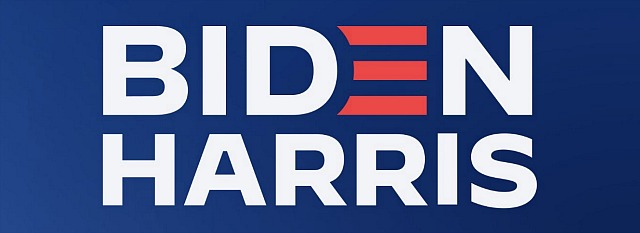
Small Quibble
I haven’t received my Kindle review copy of Glenn Kenny‘s “Made Men” (Hanover Square Press, 9.15.20), a 400-page history of the making of Martin Scorsese‘s Goodfellas (’90).
Critic and book author Shawn Levy (“Rat Pack Confidential”, “The Castle on Sunset”), whom I’ve known for years, has called Kenny’s book “impeccably researched, fluently written, and infused with insight, wit and mastery…exactly what you want from a making-of-your-favorite-movie book. From mob stories to the nuts-and-bolts business of crafting a masterpiece, it’s all here…you’d have to be a real schnook not to read it.”
I don’t want to make a big deal about this but I was little perplexed about the book’s front cover, which shows the rear half of a bullet-riddled pink Cadillac.
The allusion, of course, is to the pink Caddy bought by Frank Pellegrino‘s Johnny Dio (aka “Johnny Roastbeef”) with a wad of stolen Lufthansa loot. Robert De Niro‘s Jimmy Conway, the Lufthansa heist ringleader, is infuriated that Johnny bought the damn thing after being warned not to spend money on anything flashy.
Johnny tries to explain it away (“It’s in my mother’s name”), offers a soft apology (“Sorry, Jimmy”), etc. Nonetheless three or four scenes later he and his blonde wife end up whacked in the front seat of the Caddy.
The problem is that Johnny Roastbeef’s pink Caddy is a 1979 model with a white top, and the caddy on the book cover is a ’63 or ’64 model with mild fins and no white top. Plus the color of movie version is ripe and loud while the book-cover version is pinkish beige.
This is not a capital crime on the part of the book-cover designer, but why not use the caddy we all saw in the movie? Obviously it’s an easy get — a no-brainer. I’m just not understanding the ’63 or ’64. The snafu doesn’t hurt anyone or get in the way of the actual content (i.e., Kenny’s research, reporting and seductive prose style) but again…why?
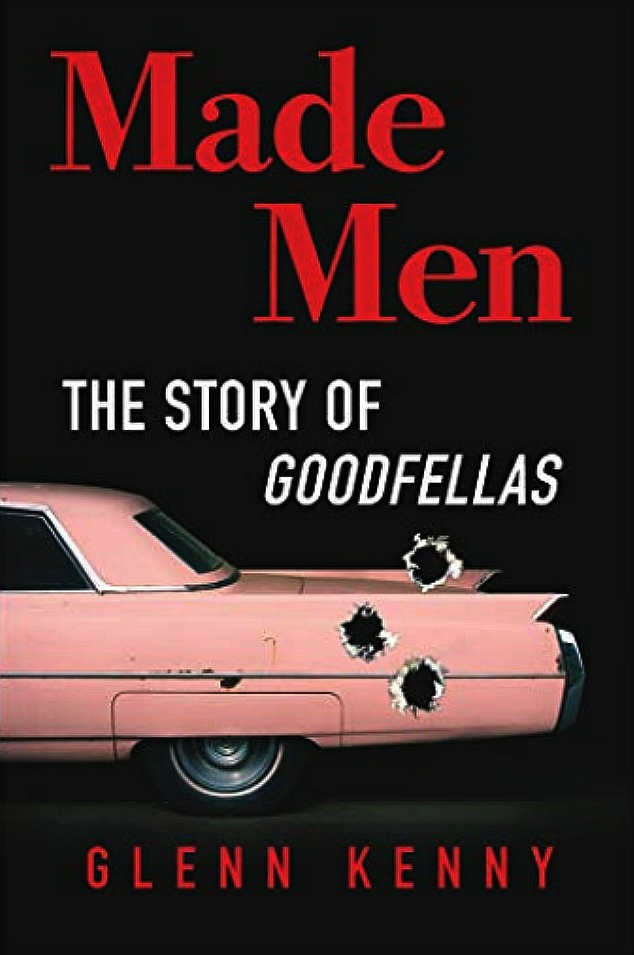
Rear section of a 1963 or ’64 pink Cadillac.
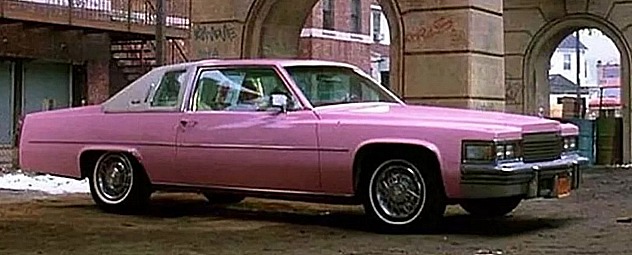
Johnny Roastbeef’s 1979 pink Caddy as shown in Goodfellas.
“If I Had A Bell…”
Poor Trini Lopez, 83, died earlier today from COVID complications. Lopez was first and foremost a pop singer who caught a wave between the late ’50s and late ’60s, particularly from his recordings of Pete Seeger and Lee Hays‘ “If I Had A Hammer” (’63) and Will Holt‘s “Lemon Tree” (’64).
Wiki excerpt: “Lopez was still recording and performing in recent years. He took part in a benefit concert to raise money for the victims of the 2004 Indian Ocean earthquake and tsunami and recently appeared as a guest performer in a number of shows held in Maastricht in the Netherlands with the Dutch violinist and composer André Rieu. Lopez’s ‘El Immortal’ was released in 2010, and in 2011 he released his 65th album, ‘Into The Future.'”
I’m not sure if Lopez was a serious Rat Pack member or not, but he did take part in a 1965 Soupy Sales pie-fight taping with Frank Sinatra and Sammy Davis, Jr.
Yes, Lopez costarred in The Dirty Dozen but that was hardly his most noteworthy achievement.
Biden-Harris Have To Stand Up To Strident Wokesters, Chaotic Left
Joe Biden and Kamala Harris obviously have the upper polling hand against Trump-Pence, but they could lose some of their support and perhaps even risk weakening a potential pro-liberal Congressional tsunami if they don’t stand up to strident leftism.
By this I mean (a) the Neverending Street Protests in Portland, Seattle and Chicago (and particularly the looting), which average Americans are sick to death of, and (b) the Stalinist scourge of extreme wokesterism, cancel culture and 1619 Project absolutism.
I’m serious — if Joe and Kammy don’t grow a pair and say “enough!” or at least “dial it down” to lefty hardcores, they could be facing a tougher situation come early November.
Yesterday a Black Lives Matter organizer named Ariel Atkins defended widespread looting in Chicago last weekend, calling it “reparation.”
“I don’t care if somebody decides to loot a Gucci’s or a Macy’s or a Nike because that makes sure that that person eats…that makes sure that person has clothes,” Atkins said at a Chicago rally on Monday, according to WMAQ-TV.
Atkins: “That’s a reparation. Anything they want to take, take it because these businesses have insurance.”
WHAT??
This is what I mean — if Biden and Harris don’t say “no, you’re wrong, Ariel…looting will not be tolerated,” things could change.
Police Superintendent David Brown said Monday that 100 people have been cuffed and 13 cops were injured during overnight clashes. Brown and Mayor Lori Lightfoot said the looting was not a part of an organized protest.
“[That] was an incident of pure criminality,” Brown remarked.
HE to Ariel and other Chicago street assholes: Thanks, guys! Keep it up! Maybe you can help swing the general election to Trump…who knows?


